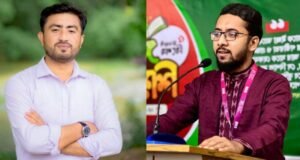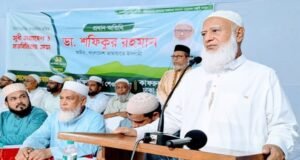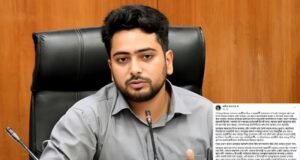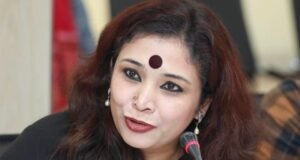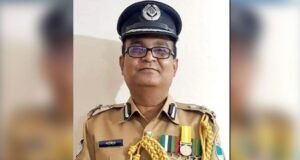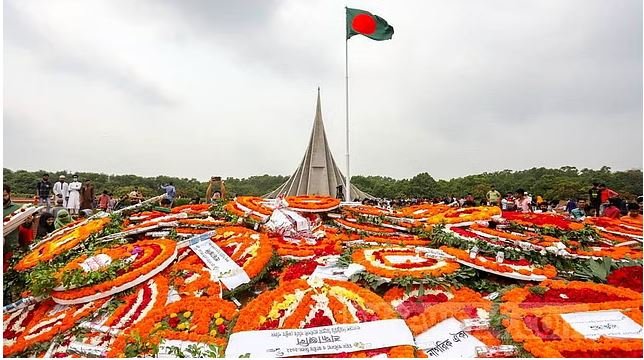
The nation is celebrating the 53rd Independence and National Day on Sunday (March 26) in a befitting manner.
The day’s programmes began by placing wreaths at the altar of the National Memorial in Savar, on the outskirts of the capital.
President Md Abdul Hamid and Prime Minister Sheikh Hasina placed the wreaths early in the morning as a mark of profound respect to the memories of the martyrs.
Today is a public holiday.
The national flag is hoisted atop all government, semi-government, autonomous and private buildings with the rises of sun while all streets and important city intersections are decorated with national and multi-coloured miniature flags and festoons.
Bands of different forces played music at different important points in Dhaka.
Important buildings and establishments as well as city streets and islands are illuminated with colourful lights.
People from all walks of life, including families of Bir Shreshthas, war wounded freedom fighters, members of the diplomatic corps, leaders of different political parties, social, cultural and professional bodies, also laid wreaths at the national memorial in the morning of the day.
On the occasion, President M Abdul Hamid and his wife Rashida Khanam will host a reception at the Bangabhaban today.
Prime Minister Sheikh Hasina will join the reception on the lawn of the Bangabhaban at about 5 pm.
President M Abdul Hamid and Prime Minister Sheikh Hasina will cut a cake on the occasion of the day.
They will exchange greetings with the injured freedom fighters and other dignitaries and guests at the function.
Later, the reception will be followed by an iftar party.
National dailies brought out special supplements while Bangladesh Betar, Bangladesh Television, private radio stations and television channels are airing month-long special programmes on the Liberation War and highlighting the significance of the day.
Bangladesh Shilpakala Academy, Bangla Academy, National Museum, Liberation War Museum, Bangladesh Shishu Academy and other social and cultural organisations will arrange discussions, cultural programmes and sports competition while painting competition for children, essay and debate competitions will be organised.
Liberation War based documentaries and movies will be screened at cinema halls across the country.
Reception will be accorded to the freedom fighters and the members of martyred freedom fighters at city, zilla and upazila levels while Bangladesh Postal Office will publish commemorating postal stamps.
Special prayers will be offered at all mosques, temples, churches and other places of worship across the country seeking divine blessings for the eternal peace of the departed souls of Father of the Nation, four national leaders,
martyrs of the War of Liberation and all other patriotic sons of the soil.
Improved meals will be served to the inmates of hospitals, jails, old homes and orphanage centres to mark the day. The country’s all children’s parks and museums will remain open for all.
Ships of Bangladesh Navy and Coast Guard will be kept open for public at Chittagong, Khulna, Mongla and Payra ports and Dhaka’s Sadarghat, Narayanganj’s Pagla, Barisal and Chandpur BIWTA dockside from 9 am to 2 pm on the day.
The missions abroad will also celebrate the day through similar programmes.
Every year, the March 26 brings the most tragic reminiscence of the history’s blackest episode that heralded a nine-month bloody ordeal from the night of March 25, 1971, achieving the long-cherished independence on December 16 the same year at the cost of a sea of blood.
In the wake of the military crackdown, Father of the Nation Bangabandhu Sheikh Mujibur Rahman, who became the undisputed leader of the then Pakistan following the massive victory of his party, Awami League, in the 1970 general elections, declared the independence of Bangladesh through the then EPR (East Pakistan Rifles) wireless at 00-30 hours on March 26 (the night following March 25) in 1971 at his historic Road-32 residence at Dhanmondi.
The great leader also called upon the people to build up strong resistance against the Pakistani barbaric occupation forces.
The Pakistani military junta, in a bid to stop the legitimate movement of the Bangalees, arrested Bangabandhu on that night following his declaration of independence.
Later, Bangabandhu was taken to the then West Pakistan where he had to spend nine months in a dark condemned cell.
Bangabandhu wrote down the declaration of independence soon after the Pakistani army cracked down on the fateful night of March 25, 1971.
The declaration of independence was soon put on air by wireless. The declaration was first broadcast by Awami League leader MA Hannan from Kalurghat Radio Station in the port city of Chittagong on March 26, 1971.
The Pakistani military junta in their monstrous outburst unleashed a bloody holocaust breaking the silence of the night following March 25 in 1971 when they mercilessly killed hundreds of innocent sleeping Bangalees, including teachers, students, police, soldiers, pedestrians and rickshaw-pullers, here.
The nation soon launched the War of Liberation at the call of Father of the Nation Bangabandhu Sheikh Mujibur Rahman in the early hours of March 26.
Bangladesh emerged as an independent and sovereign country on December 16, 1971 with the surrender of the Pakistani occupation forces, who killed three million innocent civilians, perpetrated atrocities on two lakh Bangalee women and burnt down lakhs of houses across the country during the nine-month bloody war.
 Weekly Bangla Mirror | Bangla Mirror, Bangladeshi news in UK, bangla mirror news
Weekly Bangla Mirror | Bangla Mirror, Bangladeshi news in UK, bangla mirror news


